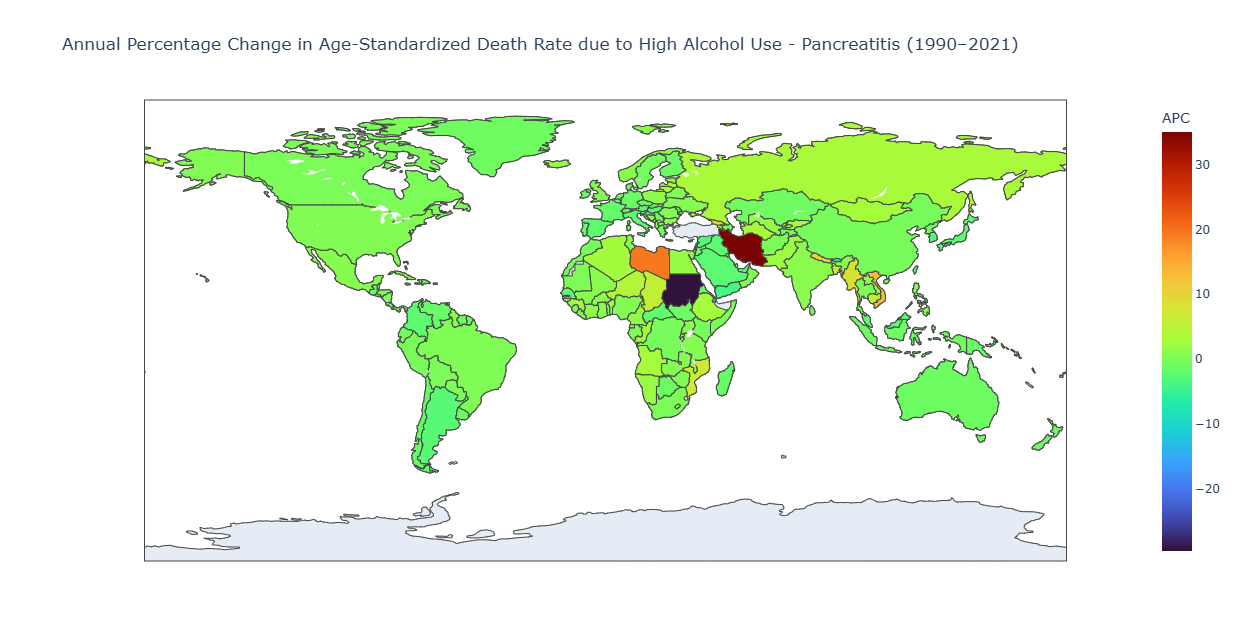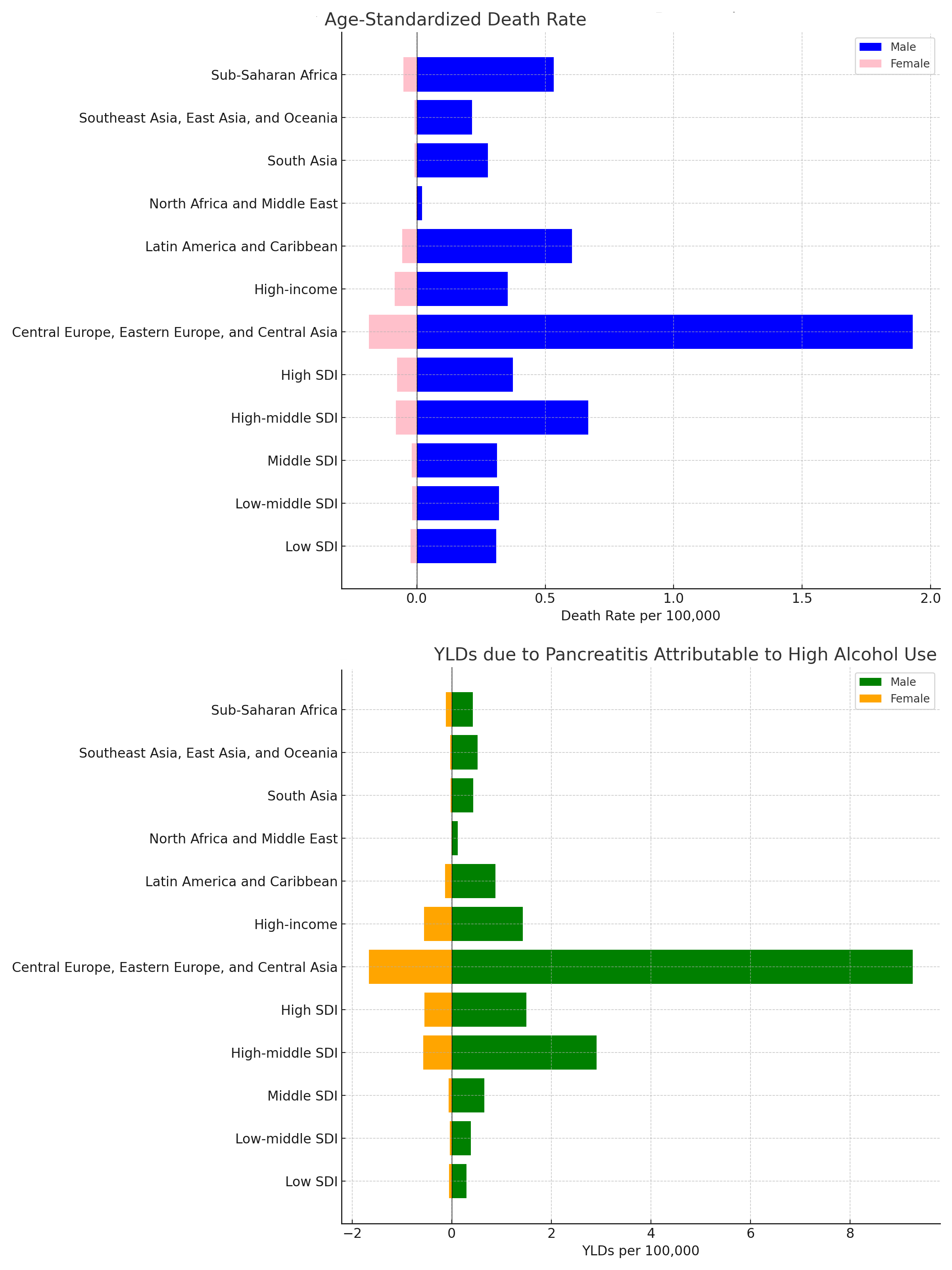Monday Poster Session
Category: Biliary/Pancreas
P2204 - Global Burden and Trends of Pancreatitis Attributable to High Alcohol Consumption in 204 Countries and Territories,1990-2021: A Comparative Risk Assessment Study
Monday, October 27, 2025
10:30 AM - 4:00 PM PDT
Location: Exhibit Hall
- MA
Madhu Babu Adusumilli, MD
University of Central Florida, HCA Healthcare GME
Ocala, FL
Presenting Author(s)
Madhu Babu Adusumilli, MD1, Ker Patel, MBBS2, Sandeep Kotnani, MBBS3, Raghava Rao Alluri, MD4, Kavya Darji, MBBS5, Freny RipalKumar Patel, MBBS6, Prince Nileshkumar Modi, MBBS7, Vishrant Amin, MBBS, MD8, Hardik Desai, MBBS9
1University of Central Florida, HCA Healthcare GME, Ocala, FL; 2Government Medical College and Hospital, Chicago, IL; 3Rutgers Monmouth Medical Center, Long Branch, NJ; 4Prime South GME Consortium/Harlingen Medical Center Program, Harlingen, TX; 5Gcs medical college, Ahmedabad, Gujarat, India; 6Pramukh Swami Medical College, Gokalnagar, Karamsad, Anand, Gujarat- 388325, Aanand, Gujarat, India; 7Pramukh Swami Medical College, Gokalnagar, Karamsad, Anand, Aanand, Gujarat, India; 8HMH JFK University Medical Center, Milltown, NJ; 9Independent Clinical and Public Health Researcher, Ahmedabad, Gujarat, India
Introduction: Pancreatitis is a debilitating condition with substantial global health impact, and alcohol misuse remains one of its most preventable drivers. Despite decades of public health interventions, the burden of alcohol-related pancreatitis remains poorly quantified across diverse geographies.
Methods: Using the Global Burden of Disease Study 2021 comparative risk assessment framework, we quantified the burden of pancreatitis attributable to high alcohol consumption across 204 countries and territories. Population-attributable fractions (PAFs) were computed by comparing country-specific exposure distributions of alcohol consumption to theoretical minimum risk exposure levels (TMRELs). These PAFs were applied to age-standardized rates and absolute counts of deaths, disability-adjusted life years (DALYs), and years lived with disability (YLDs) to estimate attributable burden. We analyzed trends over time using the annualized percentage change (APC) in age-standardized rates, stratified by age, sex, location, and year.
Results: From 1990 to 2021, the global number of deaths due to pancreatitis attributable to high alcohol use rose from 9,971 (95% UI: 6,888–13,403) to 18,749 (12,763–24,677). DALYs increased from 401,671 (280,352–543,581) to 699,335 (486,293–924,031), while YLDs rose from 44,526 (19,206–84,848) to 61,240 (26,772–116,067). Regionally, the steepest increase in total deaths was observed in the Low SDI region with a 215% rise, followed by Low-Middle SDI (210%), South Asia (210%), Sub-Saharan Africa (202%), and Middle SDI (148%). For YLDs, the most significant increases occurred in South Asia (317%) and Low SDI regions (265%). Age-wise, individuals aged 55 and older experienced the highest rise in deaths (103%), followed by those aged 20–54 (73%) and < 20 years (15%). Across sexes, males exhibited a disproportionately higher increase in burden compared to females: deaths rose by 96% in males vs. 43% in females, DALYs by 80% vs. 34%, and YLDs by 40% vs. 27%, respectively.
Discussion: The burden of pancreatitis attributable to high alcohol consumption has escalated markedly over the past three decades, with the sharpest increases observed in low and middle SDI regions, older adults, and males. These findings highlight a shifting global pattern, where alcohol-related pancreatitis is no longer confined to high-income settings but is emerging as a growing public health concern in resource-limited regions.

Figure: Annual Percentage Change in Age-Standardized Death Rate due to High Alcohol Use - Pancreatitis (1990-2021)

Figure: Age-Standardized Death Rate ; YLDs due to Pancreatitis Attributable to High Alcohol Use
Disclosures:
Madhu Babu Adusumilli indicated no relevant financial relationships.
Ker Patel indicated no relevant financial relationships.
Sandeep Kotnani indicated no relevant financial relationships.
Raghava Rao Alluri indicated no relevant financial relationships.
Kavya Darji indicated no relevant financial relationships.
Freny RipalKumar Patel indicated no relevant financial relationships.
Prince Nileshkumar Modi indicated no relevant financial relationships.
Vishrant Amin indicated no relevant financial relationships.
Hardik Desai indicated no relevant financial relationships.
Madhu Babu Adusumilli, MD1, Ker Patel, MBBS2, Sandeep Kotnani, MBBS3, Raghava Rao Alluri, MD4, Kavya Darji, MBBS5, Freny RipalKumar Patel, MBBS6, Prince Nileshkumar Modi, MBBS7, Vishrant Amin, MBBS, MD8, Hardik Desai, MBBS9. P2204 - Global Burden and Trends of Pancreatitis Attributable to High Alcohol Consumption in 204 Countries and Territories,1990-2021: A Comparative Risk Assessment Study, ACG 2025 Annual Scientific Meeting Abstracts. Phoenix, AZ: American College of Gastroenterology.
1University of Central Florida, HCA Healthcare GME, Ocala, FL; 2Government Medical College and Hospital, Chicago, IL; 3Rutgers Monmouth Medical Center, Long Branch, NJ; 4Prime South GME Consortium/Harlingen Medical Center Program, Harlingen, TX; 5Gcs medical college, Ahmedabad, Gujarat, India; 6Pramukh Swami Medical College, Gokalnagar, Karamsad, Anand, Gujarat- 388325, Aanand, Gujarat, India; 7Pramukh Swami Medical College, Gokalnagar, Karamsad, Anand, Aanand, Gujarat, India; 8HMH JFK University Medical Center, Milltown, NJ; 9Independent Clinical and Public Health Researcher, Ahmedabad, Gujarat, India
Introduction: Pancreatitis is a debilitating condition with substantial global health impact, and alcohol misuse remains one of its most preventable drivers. Despite decades of public health interventions, the burden of alcohol-related pancreatitis remains poorly quantified across diverse geographies.
Methods: Using the Global Burden of Disease Study 2021 comparative risk assessment framework, we quantified the burden of pancreatitis attributable to high alcohol consumption across 204 countries and territories. Population-attributable fractions (PAFs) were computed by comparing country-specific exposure distributions of alcohol consumption to theoretical minimum risk exposure levels (TMRELs). These PAFs were applied to age-standardized rates and absolute counts of deaths, disability-adjusted life years (DALYs), and years lived with disability (YLDs) to estimate attributable burden. We analyzed trends over time using the annualized percentage change (APC) in age-standardized rates, stratified by age, sex, location, and year.
Results: From 1990 to 2021, the global number of deaths due to pancreatitis attributable to high alcohol use rose from 9,971 (95% UI: 6,888–13,403) to 18,749 (12,763–24,677). DALYs increased from 401,671 (280,352–543,581) to 699,335 (486,293–924,031), while YLDs rose from 44,526 (19,206–84,848) to 61,240 (26,772–116,067). Regionally, the steepest increase in total deaths was observed in the Low SDI region with a 215% rise, followed by Low-Middle SDI (210%), South Asia (210%), Sub-Saharan Africa (202%), and Middle SDI (148%). For YLDs, the most significant increases occurred in South Asia (317%) and Low SDI regions (265%). Age-wise, individuals aged 55 and older experienced the highest rise in deaths (103%), followed by those aged 20–54 (73%) and < 20 years (15%). Across sexes, males exhibited a disproportionately higher increase in burden compared to females: deaths rose by 96% in males vs. 43% in females, DALYs by 80% vs. 34%, and YLDs by 40% vs. 27%, respectively.
Discussion: The burden of pancreatitis attributable to high alcohol consumption has escalated markedly over the past three decades, with the sharpest increases observed in low and middle SDI regions, older adults, and males. These findings highlight a shifting global pattern, where alcohol-related pancreatitis is no longer confined to high-income settings but is emerging as a growing public health concern in resource-limited regions.

Figure: Annual Percentage Change in Age-Standardized Death Rate due to High Alcohol Use - Pancreatitis (1990-2021)

Figure: Age-Standardized Death Rate ; YLDs due to Pancreatitis Attributable to High Alcohol Use
Disclosures:
Madhu Babu Adusumilli indicated no relevant financial relationships.
Ker Patel indicated no relevant financial relationships.
Sandeep Kotnani indicated no relevant financial relationships.
Raghava Rao Alluri indicated no relevant financial relationships.
Kavya Darji indicated no relevant financial relationships.
Freny RipalKumar Patel indicated no relevant financial relationships.
Prince Nileshkumar Modi indicated no relevant financial relationships.
Vishrant Amin indicated no relevant financial relationships.
Hardik Desai indicated no relevant financial relationships.
Madhu Babu Adusumilli, MD1, Ker Patel, MBBS2, Sandeep Kotnani, MBBS3, Raghava Rao Alluri, MD4, Kavya Darji, MBBS5, Freny RipalKumar Patel, MBBS6, Prince Nileshkumar Modi, MBBS7, Vishrant Amin, MBBS, MD8, Hardik Desai, MBBS9. P2204 - Global Burden and Trends of Pancreatitis Attributable to High Alcohol Consumption in 204 Countries and Territories,1990-2021: A Comparative Risk Assessment Study, ACG 2025 Annual Scientific Meeting Abstracts. Phoenix, AZ: American College of Gastroenterology.
